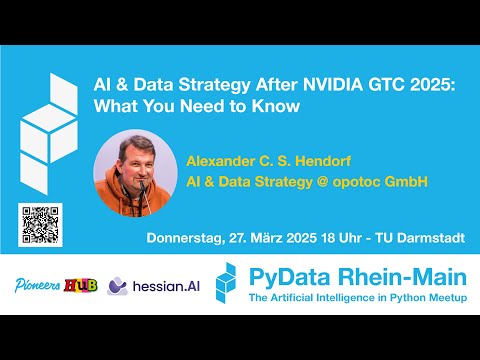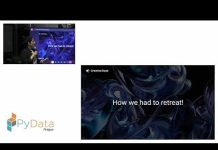AI & Data Strategy After NVIDIA GTC 2025: What You Need to KnowAlexander C. S. Hendorf
AI & Data Strategy After NVIDIA GTC 2025: What You Need to Know
Alexander C. S. Hendorf
AI & Data Strategy and Implementation @ opotoc GmbH
NVIDIA GTC is one of the most influential conferences in AI, showcasing advancements in accelerated computing, robotics, healthcare, and finance. In this talk, Alexander Hendorf will share his key takeaways from the conference, focusing on what’s most relevant for the community. From cutting-edge AI hardware and model optimization to real-world applications in robotics, healthcare, and financial modeling, we’ll explore how these technologies impact data workflows. Expect insights on practical AI adoption, the latest breakthroughs in GPU acceleration, and what’s actually useful (vs. just hype) for data scientists and engineers.
About the Speaker
Alexander is a data intelligence and AI expert with over 20 years of experience in digitalization and data-driven decision-making. As an independent consultant, he’s specialized in AI & data strategy and implementation. A frequent speaker and chair at international conferences like PyCon DE, PyData Berlin, and EuroPython, he is also a Python Software Foundation Fellow and EuroPython Fellow. He serves on the board of the Python Software Verband and, since 2024, has also been leading Pioneers Hub, a non-profit dedicated to supporting tech communities.
Acknowledgements
Hessian.AI, for hosting the meetup.
https://hessian.ai/
PIONEERS HUB, for organising.
https://pioneershub.org/
www.pydata.org
PyData is an educational program of NumFOCUS, a 501(c)3 non-profit organization in the United States. PyData provides a forum for the international community of users and developers of data analysis tools to share ideas and learn from each other. The global PyData network promotes discussion of best practices, new approaches, and emerging technologies for data management, processing, analytics, and visualization. PyData communities approach data science using many languages, including (but not limited to) Python, Julia, and R.





![How to Hack an Agent – or Not · Thomas Fraunholz [PyData Rhein-Main]](https://vlosk.com/wp-content/uploads/2025/03/thumbnail-1935-218x150.jpg)












